VU21651: Analyse and Evaluate Criminal Law Concepts and Principles
VerifiedAdded on 2023/06/03
|6
|1349
|240
Homework Assignment
AI Summary
This assignment analyzes and evaluates key concepts and principles of criminal law, addressing the definition of crime, the relevant legislation in Victoria (Crimes Act 1958), and the essential elements of a crime (actus reus and mens rea). It explores the purposes of criminal law, the processes of charging and bringing a case before the court, including bail, dismissal, acquittal, and discharge. The assignment outlines penalties for various crimes and discusses the Criminal Procedure Act 2009 (Vic), the Evidence Act 2008 (Vic), and the role of the Charter of Human Rights and Responsibilities Act 2006 (Vic). Furthermore, it defines and discusses homicide, differentiates between murder and manslaughter, and examines legal issues like euthanasia and abortion law reform in Victoria, providing a comprehensive overview of the subject matter.
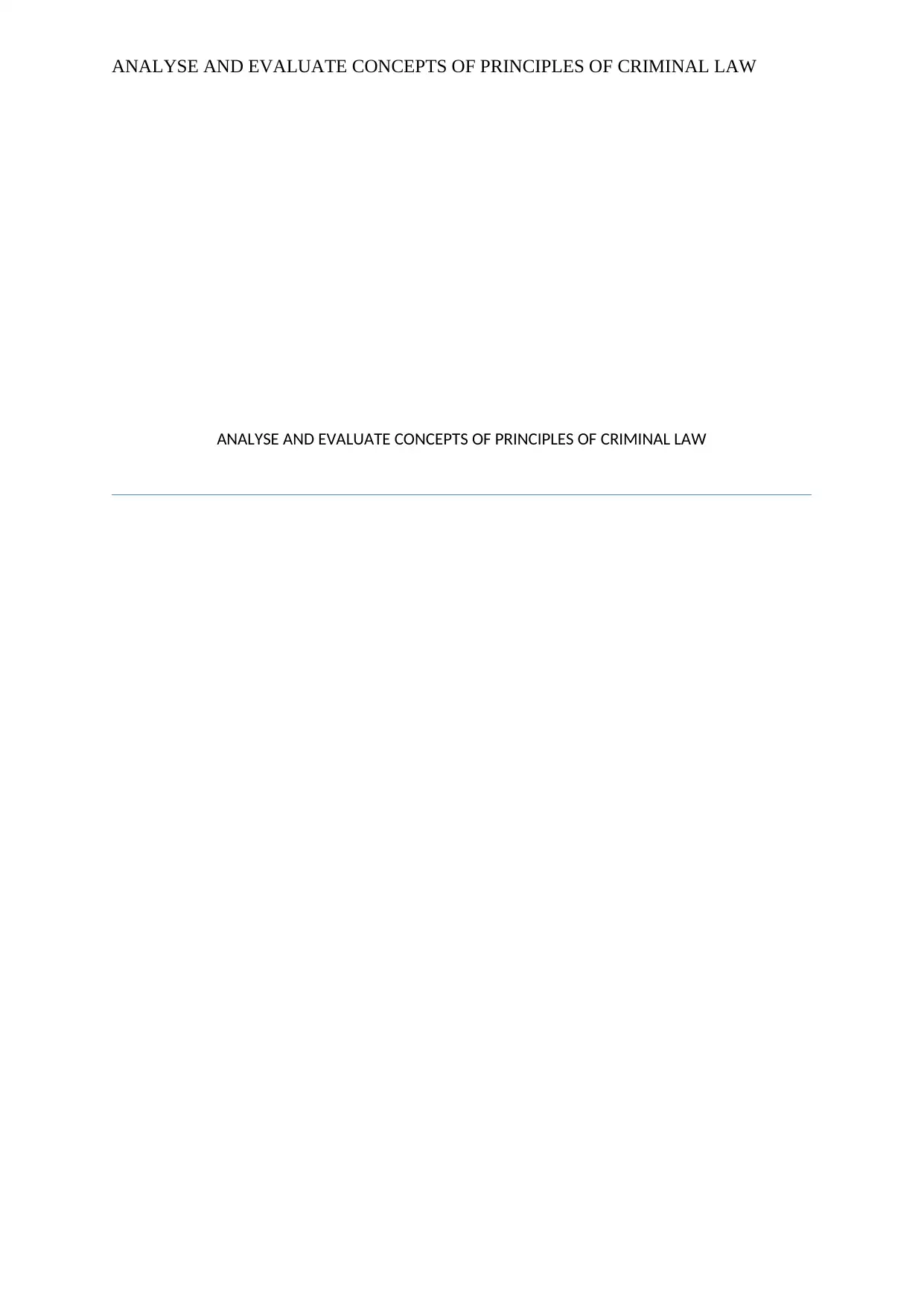
ANALYSE AND EVALUATE CONCEPTS OF PRINCIPLES OF CRIMINAL LAW
ANALYSE AND EVALUATE CONCEPTS OF PRINCIPLES OF CRIMINAL LAW
ANALYSE AND EVALUATE CONCEPTS OF PRINCIPLES OF CRIMINAL LAW
Paraphrase This Document
Need a fresh take? Get an instant paraphrase of this document with our AI Paraphraser
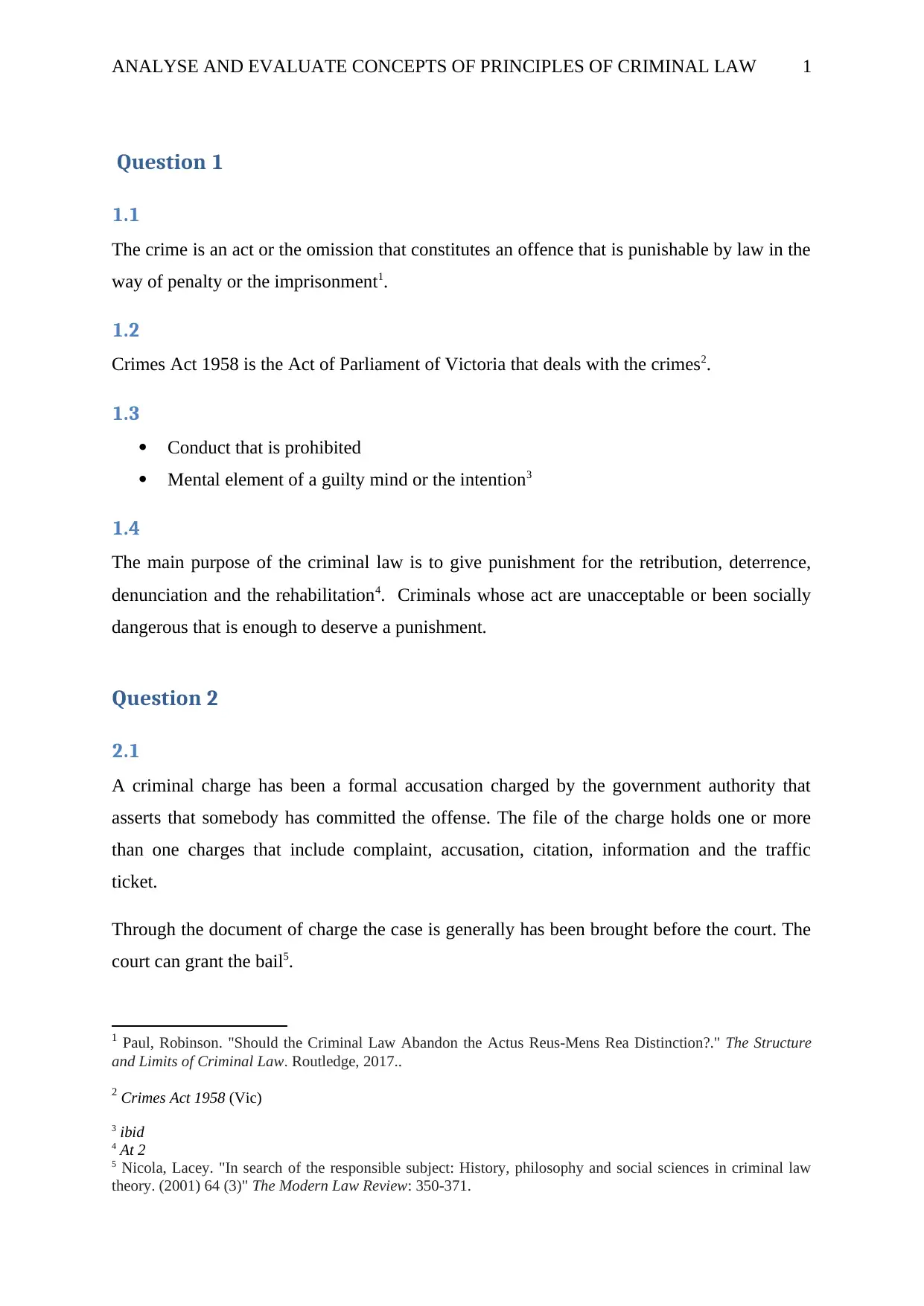
ANALYSE AND EVALUATE CONCEPTS OF PRINCIPLES OF CRIMINAL LAW 1
Question 1
1.1
The crime is an act or the omission that constitutes an offence that is punishable by law in the
way of penalty or the imprisonment1.
1.2
Crimes Act 1958 is the Act of Parliament of Victoria that deals with the crimes2.
1.3
Conduct that is prohibited
Mental element of a guilty mind or the intention3
1.4
The main purpose of the criminal law is to give punishment for the retribution, deterrence,
denunciation and the rehabilitation4. Criminals whose act are unacceptable or been socially
dangerous that is enough to deserve a punishment.
Question 2
2.1
A criminal charge has been a formal accusation charged by the government authority that
asserts that somebody has committed the offense. The file of the charge holds one or more
than one charges that include complaint, accusation, citation, information and the traffic
ticket.
Through the document of charge the case is generally has been brought before the court. The
court can grant the bail5.
1 Paul, Robinson. "Should the Criminal Law Abandon the Actus Reus-Mens Rea Distinction?." The Structure
and Limits of Criminal Law. Routledge, 2017..
2 Crimes Act 1958 (Vic)
3 ibid
4 At 2
5 Nicola, Lacey. "In search of the responsible subject: History, philosophy and social sciences in criminal law
theory. (2001) 64 (3)" The Modern Law Review: 350-371.
Question 1
1.1
The crime is an act or the omission that constitutes an offence that is punishable by law in the
way of penalty or the imprisonment1.
1.2
Crimes Act 1958 is the Act of Parliament of Victoria that deals with the crimes2.
1.3
Conduct that is prohibited
Mental element of a guilty mind or the intention3
1.4
The main purpose of the criminal law is to give punishment for the retribution, deterrence,
denunciation and the rehabilitation4. Criminals whose act are unacceptable or been socially
dangerous that is enough to deserve a punishment.
Question 2
2.1
A criminal charge has been a formal accusation charged by the government authority that
asserts that somebody has committed the offense. The file of the charge holds one or more
than one charges that include complaint, accusation, citation, information and the traffic
ticket.
Through the document of charge the case is generally has been brought before the court. The
court can grant the bail5.
1 Paul, Robinson. "Should the Criminal Law Abandon the Actus Reus-Mens Rea Distinction?." The Structure
and Limits of Criminal Law. Routledge, 2017..
2 Crimes Act 1958 (Vic)
3 ibid
4 At 2
5 Nicola, Lacey. "In search of the responsible subject: History, philosophy and social sciences in criminal law
theory. (2001) 64 (3)" The Modern Law Review: 350-371.
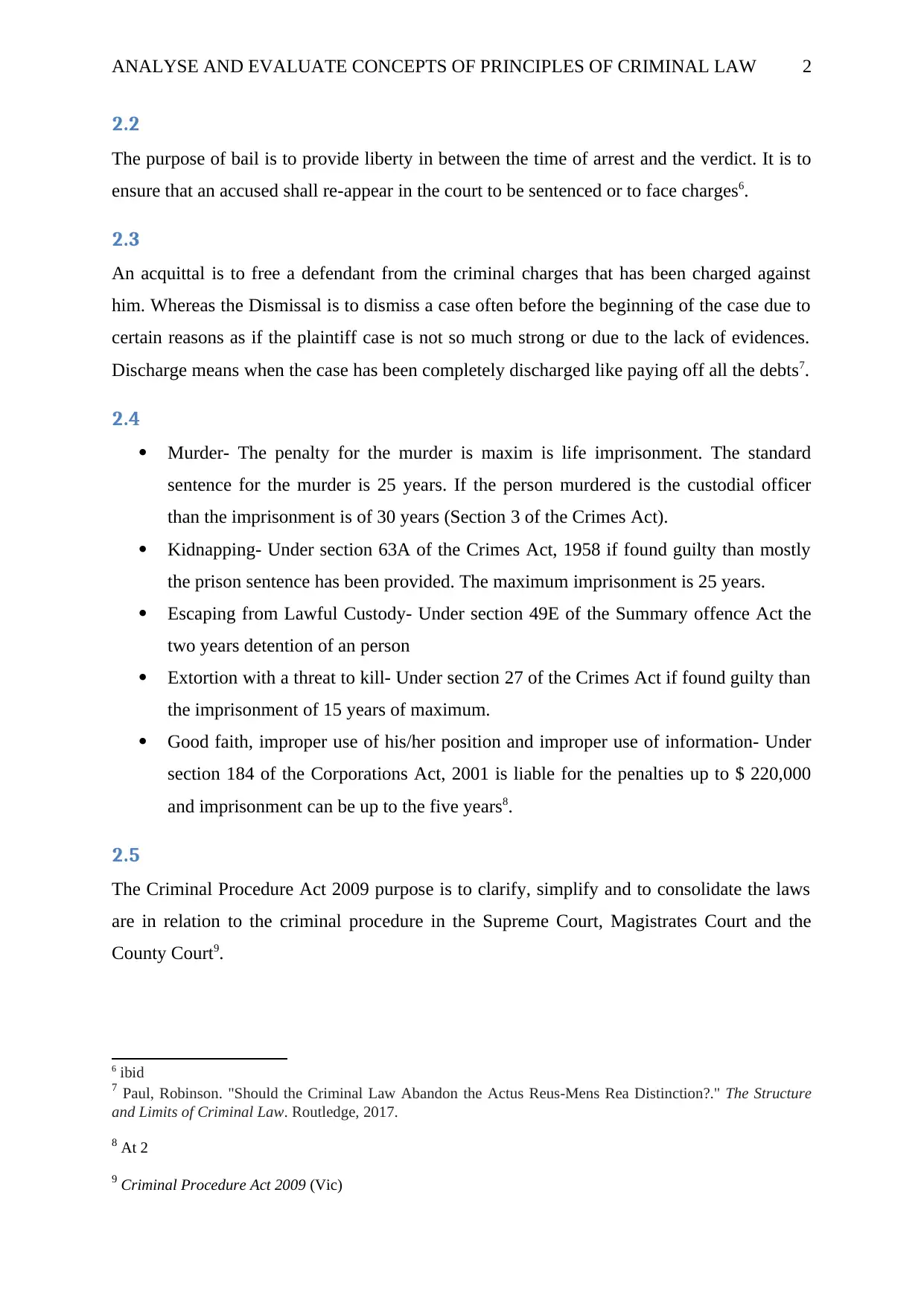
ANALYSE AND EVALUATE CONCEPTS OF PRINCIPLES OF CRIMINAL LAW 2
2.2
The purpose of bail is to provide liberty in between the time of arrest and the verdict. It is to
ensure that an accused shall re-appear in the court to be sentenced or to face charges6.
2.3
An acquittal is to free a defendant from the criminal charges that has been charged against
him. Whereas the Dismissal is to dismiss a case often before the beginning of the case due to
certain reasons as if the plaintiff case is not so much strong or due to the lack of evidences.
Discharge means when the case has been completely discharged like paying off all the debts7.
2.4
Murder- The penalty for the murder is maxim is life imprisonment. The standard
sentence for the murder is 25 years. If the person murdered is the custodial officer
than the imprisonment is of 30 years (Section 3 of the Crimes Act).
Kidnapping- Under section 63A of the Crimes Act, 1958 if found guilty than mostly
the prison sentence has been provided. The maximum imprisonment is 25 years.
Escaping from Lawful Custody- Under section 49E of the Summary offence Act the
two years detention of an person
Extortion with a threat to kill- Under section 27 of the Crimes Act if found guilty than
the imprisonment of 15 years of maximum.
Good faith, improper use of his/her position and improper use of information- Under
section 184 of the Corporations Act, 2001 is liable for the penalties up to $ 220,000
and imprisonment can be up to the five years8.
2.5
The Criminal Procedure Act 2009 purpose is to clarify, simplify and to consolidate the laws
are in relation to the criminal procedure in the Supreme Court, Magistrates Court and the
County Court9.
6 ibid
7 Paul, Robinson. "Should the Criminal Law Abandon the Actus Reus-Mens Rea Distinction?." The Structure
and Limits of Criminal Law. Routledge, 2017.
8 At 2
9 Criminal Procedure Act 2009 (Vic)
2.2
The purpose of bail is to provide liberty in between the time of arrest and the verdict. It is to
ensure that an accused shall re-appear in the court to be sentenced or to face charges6.
2.3
An acquittal is to free a defendant from the criminal charges that has been charged against
him. Whereas the Dismissal is to dismiss a case often before the beginning of the case due to
certain reasons as if the plaintiff case is not so much strong or due to the lack of evidences.
Discharge means when the case has been completely discharged like paying off all the debts7.
2.4
Murder- The penalty for the murder is maxim is life imprisonment. The standard
sentence for the murder is 25 years. If the person murdered is the custodial officer
than the imprisonment is of 30 years (Section 3 of the Crimes Act).
Kidnapping- Under section 63A of the Crimes Act, 1958 if found guilty than mostly
the prison sentence has been provided. The maximum imprisonment is 25 years.
Escaping from Lawful Custody- Under section 49E of the Summary offence Act the
two years detention of an person
Extortion with a threat to kill- Under section 27 of the Crimes Act if found guilty than
the imprisonment of 15 years of maximum.
Good faith, improper use of his/her position and improper use of information- Under
section 184 of the Corporations Act, 2001 is liable for the penalties up to $ 220,000
and imprisonment can be up to the five years8.
2.5
The Criminal Procedure Act 2009 purpose is to clarify, simplify and to consolidate the laws
are in relation to the criminal procedure in the Supreme Court, Magistrates Court and the
County Court9.
6 ibid
7 Paul, Robinson. "Should the Criminal Law Abandon the Actus Reus-Mens Rea Distinction?." The Structure
and Limits of Criminal Law. Routledge, 2017.
8 At 2
9 Criminal Procedure Act 2009 (Vic)
⊘ This is a preview!⊘
Do you want full access?
Subscribe today to unlock all pages.

Trusted by 1+ million students worldwide
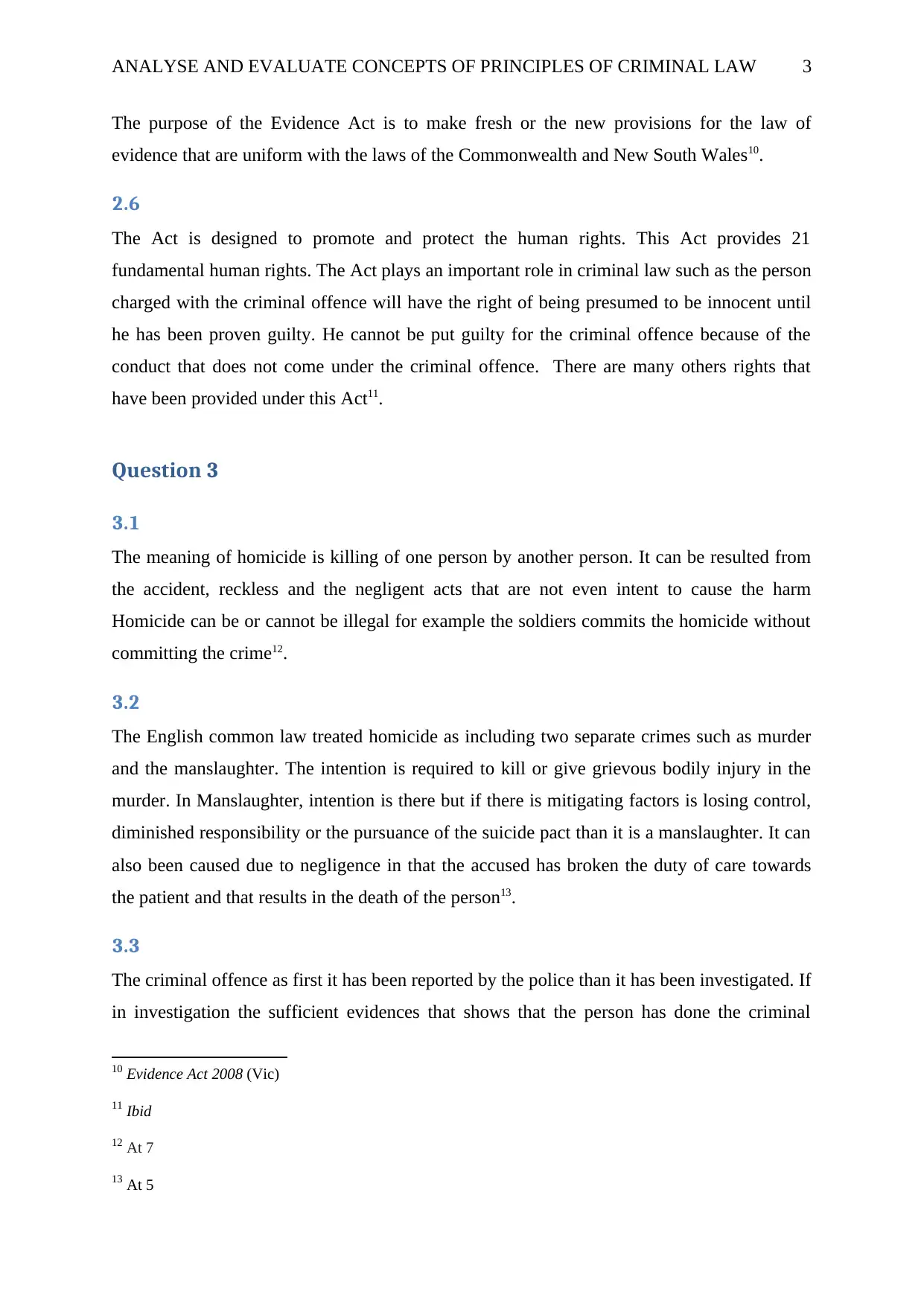
ANALYSE AND EVALUATE CONCEPTS OF PRINCIPLES OF CRIMINAL LAW 3
The purpose of the Evidence Act is to make fresh or the new provisions for the law of
evidence that are uniform with the laws of the Commonwealth and New South Wales10.
2.6
The Act is designed to promote and protect the human rights. This Act provides 21
fundamental human rights. The Act plays an important role in criminal law such as the person
charged with the criminal offence will have the right of being presumed to be innocent until
he has been proven guilty. He cannot be put guilty for the criminal offence because of the
conduct that does not come under the criminal offence. There are many others rights that
have been provided under this Act11.
Question 3
3.1
The meaning of homicide is killing of one person by another person. It can be resulted from
the accident, reckless and the negligent acts that are not even intent to cause the harm
Homicide can be or cannot be illegal for example the soldiers commits the homicide without
committing the crime12.
3.2
The English common law treated homicide as including two separate crimes such as murder
and the manslaughter. The intention is required to kill or give grievous bodily injury in the
murder. In Manslaughter, intention is there but if there is mitigating factors is losing control,
diminished responsibility or the pursuance of the suicide pact than it is a manslaughter. It can
also been caused due to negligence in that the accused has broken the duty of care towards
the patient and that results in the death of the person13.
3.3
The criminal offence as first it has been reported by the police than it has been investigated. If
in investigation the sufficient evidences that shows that the person has done the criminal
10 Evidence Act 2008 (Vic)
11 Ibid
12 At 7
13 At 5
The purpose of the Evidence Act is to make fresh or the new provisions for the law of
evidence that are uniform with the laws of the Commonwealth and New South Wales10.
2.6
The Act is designed to promote and protect the human rights. This Act provides 21
fundamental human rights. The Act plays an important role in criminal law such as the person
charged with the criminal offence will have the right of being presumed to be innocent until
he has been proven guilty. He cannot be put guilty for the criminal offence because of the
conduct that does not come under the criminal offence. There are many others rights that
have been provided under this Act11.
Question 3
3.1
The meaning of homicide is killing of one person by another person. It can be resulted from
the accident, reckless and the negligent acts that are not even intent to cause the harm
Homicide can be or cannot be illegal for example the soldiers commits the homicide without
committing the crime12.
3.2
The English common law treated homicide as including two separate crimes such as murder
and the manslaughter. The intention is required to kill or give grievous bodily injury in the
murder. In Manslaughter, intention is there but if there is mitigating factors is losing control,
diminished responsibility or the pursuance of the suicide pact than it is a manslaughter. It can
also been caused due to negligence in that the accused has broken the duty of care towards
the patient and that results in the death of the person13.
3.3
The criminal offence as first it has been reported by the police than it has been investigated. If
in investigation the sufficient evidences that shows that the person has done the criminal
10 Evidence Act 2008 (Vic)
11 Ibid
12 At 7
13 At 5
Paraphrase This Document
Need a fresh take? Get an instant paraphrase of this document with our AI Paraphraser
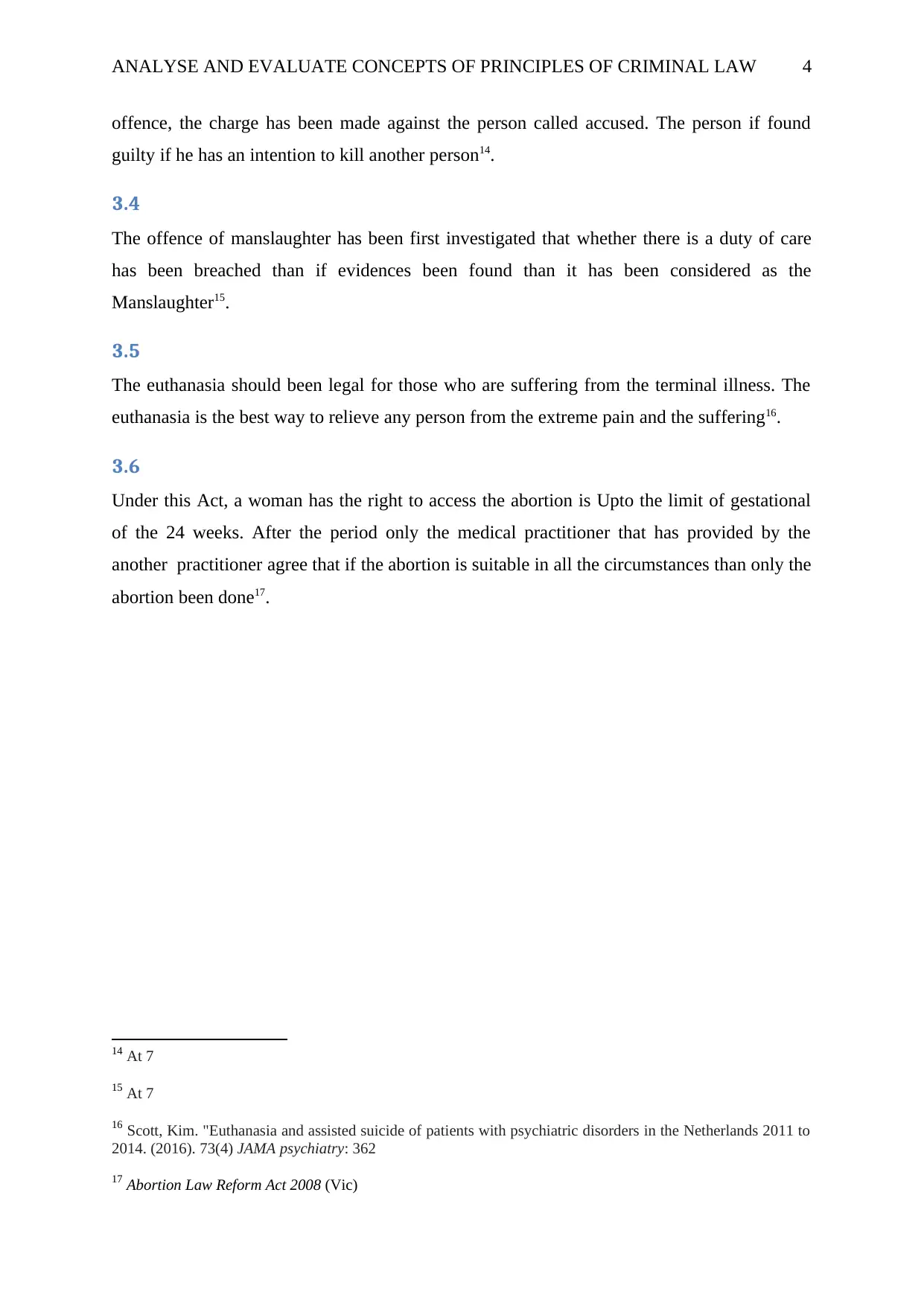
ANALYSE AND EVALUATE CONCEPTS OF PRINCIPLES OF CRIMINAL LAW 4
offence, the charge has been made against the person called accused. The person if found
guilty if he has an intention to kill another person14.
3.4
The offence of manslaughter has been first investigated that whether there is a duty of care
has been breached than if evidences been found than it has been considered as the
Manslaughter15.
3.5
The euthanasia should been legal for those who are suffering from the terminal illness. The
euthanasia is the best way to relieve any person from the extreme pain and the suffering16.
3.6
Under this Act, a woman has the right to access the abortion is Upto the limit of gestational
of the 24 weeks. After the period only the medical practitioner that has provided by the
another practitioner agree that if the abortion is suitable in all the circumstances than only the
abortion been done17.
14 At 7
15 At 7
16 Scott, Kim. "Euthanasia and assisted suicide of patients with psychiatric disorders in the Netherlands 2011 to
2014. (2016). 73(4) JAMA psychiatry: 362
17 Abortion Law Reform Act 2008 (Vic)
offence, the charge has been made against the person called accused. The person if found
guilty if he has an intention to kill another person14.
3.4
The offence of manslaughter has been first investigated that whether there is a duty of care
has been breached than if evidences been found than it has been considered as the
Manslaughter15.
3.5
The euthanasia should been legal for those who are suffering from the terminal illness. The
euthanasia is the best way to relieve any person from the extreme pain and the suffering16.
3.6
Under this Act, a woman has the right to access the abortion is Upto the limit of gestational
of the 24 weeks. After the period only the medical practitioner that has provided by the
another practitioner agree that if the abortion is suitable in all the circumstances than only the
abortion been done17.
14 At 7
15 At 7
16 Scott, Kim. "Euthanasia and assisted suicide of patients with psychiatric disorders in the Netherlands 2011 to
2014. (2016). 73(4) JAMA psychiatry: 362
17 Abortion Law Reform Act 2008 (Vic)
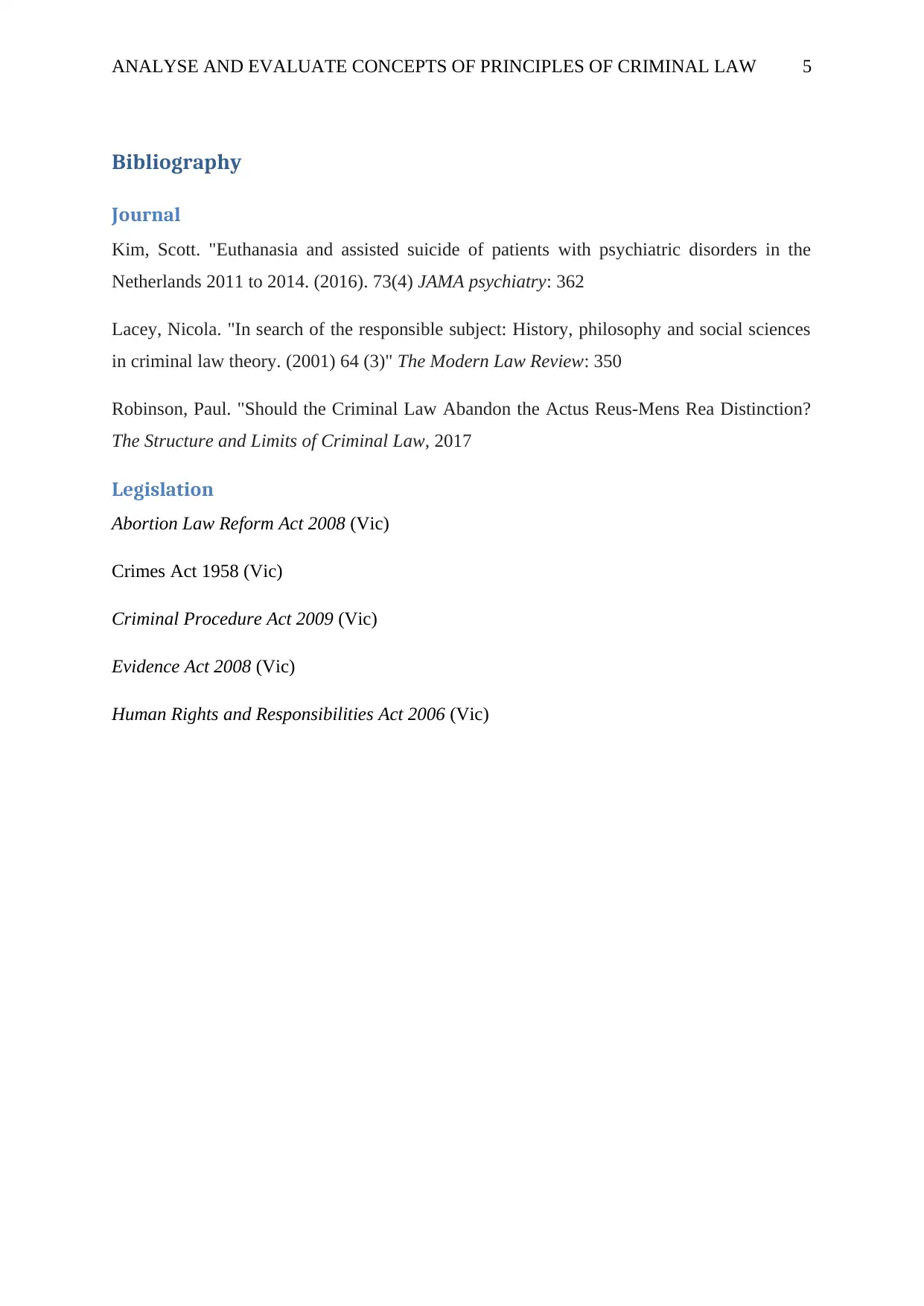
ANALYSE AND EVALUATE CONCEPTS OF PRINCIPLES OF CRIMINAL LAW 5
Bibliography
Journal
Kim, Scott. "Euthanasia and assisted suicide of patients with psychiatric disorders in the
Netherlands 2011 to 2014. (2016). 73(4) JAMA psychiatry: 362
Lacey, Nicola. "In search of the responsible subject: History, philosophy and social sciences
in criminal law theory. (2001) 64 (3)" The Modern Law Review: 350
Robinson, Paul. "Should the Criminal Law Abandon the Actus Reus-Mens Rea Distinction?
The Structure and Limits of Criminal Law, 2017
Legislation
Abortion Law Reform Act 2008 (Vic)
Crimes Act 1958 (Vic)
Criminal Procedure Act 2009 (Vic)
Evidence Act 2008 (Vic)
Human Rights and Responsibilities Act 2006 (Vic)
Bibliography
Journal
Kim, Scott. "Euthanasia and assisted suicide of patients with psychiatric disorders in the
Netherlands 2011 to 2014. (2016). 73(4) JAMA psychiatry: 362
Lacey, Nicola. "In search of the responsible subject: History, philosophy and social sciences
in criminal law theory. (2001) 64 (3)" The Modern Law Review: 350
Robinson, Paul. "Should the Criminal Law Abandon the Actus Reus-Mens Rea Distinction?
The Structure and Limits of Criminal Law, 2017
Legislation
Abortion Law Reform Act 2008 (Vic)
Crimes Act 1958 (Vic)
Criminal Procedure Act 2009 (Vic)
Evidence Act 2008 (Vic)
Human Rights and Responsibilities Act 2006 (Vic)
⊘ This is a preview!⊘
Do you want full access?
Subscribe today to unlock all pages.

Trusted by 1+ million students worldwide
1 out of 6
Related Documents
Your All-in-One AI-Powered Toolkit for Academic Success.
+13062052269
info@desklib.com
Available 24*7 on WhatsApp / Email
![[object Object]](/_next/static/media/star-bottom.7253800d.svg)
Unlock your academic potential
Copyright © 2020–2026 A2Z Services. All Rights Reserved. Developed and managed by ZUCOL.





